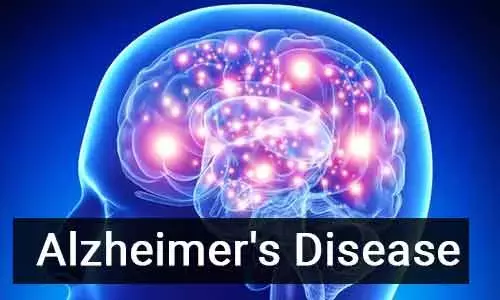- Home
- Medical news & Guidelines
- Anesthesiology
- Cardiology and CTVS
- Critical Care
- Dentistry
- Dermatology
- Diabetes and Endocrinology
- ENT
- Gastroenterology
- Medicine
- Nephrology
- Neurology
- Obstretics-Gynaecology
- Oncology
- Ophthalmology
- Orthopaedics
- Pediatrics-Neonatology
- Psychiatry
- Pulmonology
- Radiology
- Surgery
- Urology
- Laboratory Medicine
- Diet
- Nursing
- Paramedical
- Physiotherapy
- Health news
- Fact Check
- Bone Health Fact Check
- Brain Health Fact Check
- Cancer Related Fact Check
- Child Care Fact Check
- Dental and oral health fact check
- Diabetes and metabolic health fact check
- Diet and Nutrition Fact Check
- Eye and ENT Care Fact Check
- Fitness fact check
- Gut health fact check
- Heart health fact check
- Kidney health fact check
- Medical education fact check
- Men's health fact check
- Respiratory fact check
- Skin and hair care fact check
- Vaccine and Immunization fact check
- Women's health fact check
- AYUSH
- State News
- Andaman and Nicobar Islands
- Andhra Pradesh
- Arunachal Pradesh
- Assam
- Bihar
- Chandigarh
- Chattisgarh
- Dadra and Nagar Haveli
- Daman and Diu
- Delhi
- Goa
- Gujarat
- Haryana
- Himachal Pradesh
- Jammu & Kashmir
- Jharkhand
- Karnataka
- Kerala
- Ladakh
- Lakshadweep
- Madhya Pradesh
- Maharashtra
- Manipur
- Meghalaya
- Mizoram
- Nagaland
- Odisha
- Puducherry
- Punjab
- Rajasthan
- Sikkim
- Tamil Nadu
- Telangana
- Tripura
- Uttar Pradesh
- Uttrakhand
- West Bengal
- Medical Education
- Industry
How Anxiety speeds up progression of Alzheimer's disease reveals MRI study

USA: Anxiety patients progress more quickly from mild cognitive impairment (MCI) to Alzheimer's disease, finds a recent study. The study was based on MRI scans done at one point in time. The results of the study were presented at the virtual Radiological Society of North America (RSNA) 2020 conference.
Globally, Alzheimer's disease has become a major public health problems. The number of deaths from the disease has more than doubled since 2000. Many Alzheimer's disease patients suffer first from MCI, a decline in cognitive abilities like memory and thinking skills that is more rapid than normally associated with aging. Anxiety has been frequently observed in MCI patients but its role in disease progression is not well understood. Considering this, Maria Vittoria Spampinato, professor of radiology at the Medical University of South Carolina (MUSC) in Charleston, and colleagues determined if anxiety effects brain structure or if the effect of anxiety was independent from brain structure in favoring the progression of disease.
"We know that volume loss in certain areas of the brain is a factor that predicts progression to Alzheimer's disease," said Spampinato. "In this study, we wanted to see if anxiety had an effect on brain structure, or if the effect of anxiety was independent from brain structure in favoring the progression of disease."
The study included 339 patients (average age 72 years) from the Alzheimer's Disease Neuroimaging Initiative 2 cohort. Each patient had a baseline diagnosis of mild cognitive impairment; 72 progressed to Alzheimer's disease while 267 remained stable.
The researchers obtained brain MRIs to determine the baseline volumes of the hippocampus and the entorhinal cortex, two areas important to forming memories. They also tested for the presence of the ApoE4 allele, the most prevalent genetic risk factor for Alzheimer's disease. Anxiety was measured with established clinical surveys.
Key findings of the study include:
· Patients who progressed to Alzheimer's disease had significantly lower volumes in the hippocampus and the entorhinal cortex and greater frequency of the ApoE4 allele.
· Most notably though, the researchers found that anxiety was independently associated with cognitive decline.
· Mild cognitive impairment patients with anxiety symptoms developed Alzheimer's disease faster than individuals without anxiety, independently of whether they had a genetic risk factor for Alzheimer's disease or brain volume loss.
The link between anxiety symptoms and a faster progression to Alzheimer's disease presents an opportunity for improving the screening and management of patients with early mild cognitive impairment, the researchers said.
"We need to better understand the association between anxiety disorders and cognitive decline," Dr. Spampinato said. "We don't know yet if the anxiety is a symptom -- in other words, their memory is getting worse and they become anxious -- or if anxiety contributes to cognitive decline. If we were able in the future to find that anxiety is actually causing progression, then we should more aggressively screen for anxiety disorders in the elderly."
"The geriatric population is routinely screened for depression in many hospitals, but perhaps this vulnerable population should also be assessed for anxiety disorders," added study first author Jenny L. Ulber, a medical student at MUSC. "Middle-aged and elderly individuals with high level of anxiety may benefit from intervention, whether it be pharmacological or cognitive behavioral therapy, with the goal of slowing cognitive decline."
""Recognizing and treating neuropsychiatric symptoms is important in the management of patients with early MCI," concluded the authors.
Reference:
Radiological Society of North America 2020 Conference
Dr Kamal Kant Kohli-MBBS, DTCD- a chest specialist with more than 30 years of practice and a flair for writing clinical articles, Dr Kamal Kant Kohli joined Medical Dialogues as a Chief Editor of Medical News. Besides writing articles, as an editor, he proofreads and verifies all the medical content published on Medical Dialogues including those coming from journals, studies,medical conferences,guidelines etc. Email: drkohli@medicaldialogues.in. Contact no. 011-43720751


